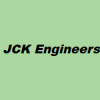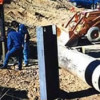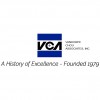Burlington Engineering, Inc., strips and treats the surface of metal products using a variety of metal finishing techniques. Paint stripping prepares metal surfaces prior to re-coating, and salt bath nitriding treats the surface of steel parts to enhance corrosion protection, wear resistance, surface hardness and provides a beautiful black finish.
In business since 1979, we have extensive experience in commercial metal paint stripping and have assisted with efforts to create more environmentally-friendly paint stripping processes. Burlington Engineering is also one of the few companies experienced in the Melonite salt bath nitriding process to enhance the wear and corrosion resistance of plain carbon steels, low alloy steels, and stainless steels.
We provide metal finishing for OEMs, commercial painting operations, and industries including medical, firearms, oil and gas, military, gear manufacturing, hydraulics, and more. Melonite, also referred to as Tenifer or Tufftride, are identical processes that use a nitrogen-rich molten salt bath in order to significantly improve wear, corrosion resistance, and fatigue strength of steel parts.
In business since 1979, we have extensive experience in commercial metal paint stripping and have assisted with efforts to create more environmentally-friendly paint stripping processes. Burlington Engineering is also one of the few companies experienced in the Melonite salt bath nitriding process to enhance the wear and corrosion resistance of plain carbon steels, low alloy steels, and stainless steels.
We provide metal finishing for OEMs, commercial painting operations, and industries including medical, firearms, oil and gas, military, gear manufacturing, hydraulics, and more. Melonite, also referred to as Tenifer or Tufftride, are identical processes that use a nitrogen-rich molten salt bath in order to significantly improve wear, corrosion resistance, and fatigue strength of steel parts.
Services
About Us
Report
Burlington Engineering has been in the metal surface treatment business since 1979.
Located in the city of Orange in Southern California we are the West Coast leader in Melonite and QPQ Liquid Nitriding/Salt Bath Nitriding.
An innovator in the development of environmentally compliant paint stripping processes, working in conjunction with US manufactures, we have designed, built, and implement cutting edge AQMD approved equipment.
For over 40 years we have developed long term relationships with customers representing many industries including the energy sector, tooling, hydraulics, pneumatics, power transmission, motorsports, US Military, firearms, mining, marine, farming, and more.
Located in the city of Orange in Southern California we are the West Coast leader in Melonite and QPQ Liquid Nitriding/Salt Bath Nitriding.
An innovator in the development of environmentally compliant paint stripping processes, working in conjunction with US manufactures, we have designed, built, and implement cutting edge AQMD approved equipment.
For over 40 years we have developed long term relationships with customers representing many industries including the energy sector, tooling, hydraulics, pneumatics, power transmission, motorsports, US Military, firearms, mining, marine, farming, and more.
Capabilities
Report
Burlington Engineering, Inc. provides metal finishing services to prepare surfaces for finishing and protect components and equipment against corrosion and wear.
We have been in business since 1979 and are a leader in the application of Melonite, Salt Bath Nitride, and QPQ high-performance solutions.
Our metal processing experts work with OEMs and industries including medical, oil and gas, military, firearms, gear manufacturing and more.
Learn more about our Melonite coating, media blasting and paint stripping services below or contact us to discuss your metal finishing project.
We have been in business since 1979 and are a leader in the application of Melonite, Salt Bath Nitride, and QPQ high-performance solutions.
Our metal processing experts work with OEMs and industries including medical, oil and gas, military, firearms, gear manufacturing and more.
Learn more about our Melonite coating, media blasting and paint stripping services below or contact us to discuss your metal finishing project.
Salt Bath Nitriding
Report
Salt bath Nitriding/Nitrocarburizing is a process that is used to protect a metal surface and enhance its wear and corrosion resistance.
During the nitriding process, a combination of nitrogen and carbon is diffused into a metal surface using a high-temperature salt bath.
This permanently changes the molecular structure of the surface to provide a higher level of protection than plating or coating the material surface.
Burlington Engineering, Inc. provides salt bath nitriding, and other metal processing services for customers throughout California and beyond.
During the nitriding process, a combination of nitrogen and carbon is diffused into a metal surface using a high-temperature salt bath.
This permanently changes the molecular structure of the surface to provide a higher level of protection than plating or coating the material surface.
Burlington Engineering, Inc. provides salt bath nitriding, and other metal processing services for customers throughout California and beyond.
Melonite Processing
Report
Melonite is a thermochemical treatment for improving the surface properties of steel parts.
It exhibits predictable and repeatable results in the treating of low and medium carbon steels, alloy steels, stainless and austenitic steels, tool and die steels, cast and sintered iron.
As the first job shop on the West Coast to offer Melonite processing, Burlington Engineering, Inc. uses its salt bath nitriding experience to diversify its servicing to the Southern California metal finishing industry.
The system has many stages, from the pre-treatment-cleaning, to pre-heat furnace, to the Melonite salts, oxidizing salts, and water-cooled and rinsed.
It exhibits predictable and repeatable results in the treating of low and medium carbon steels, alloy steels, stainless and austenitic steels, tool and die steels, cast and sintered iron.
As the first job shop on the West Coast to offer Melonite processing, Burlington Engineering, Inc. uses its salt bath nitriding experience to diversify its servicing to the Southern California metal finishing industry.
The system has many stages, from the pre-treatment-cleaning, to pre-heat furnace, to the Melonite salts, oxidizing salts, and water-cooled and rinsed.
Quench-Polish-Quench Process
Report
Resulting properties from the chemical and structural composition changes created through Melonite QPQ are increased surface hardness, lower coefficient of friction, enhanced surface lubricity, improved running wear performance, increased sliding wear resistance, and enhanced corrosion resistance.
Salt bath nitriding is also ideal for food processing and medical equipment because it does not impact the effectiveness of heat or chemical sterilization processes.
Naturally, the alloy of the substrate will influence which properties are principally affected and to what extent they are affected.
Salt bath nitriding is also ideal for food processing and medical equipment because it does not impact the effectiveness of heat or chemical sterilization processes.
Naturally, the alloy of the substrate will influence which properties are principally affected and to what extent they are affected.
Reviews

Be the first to review Burlington Engineering.
Write a Review




